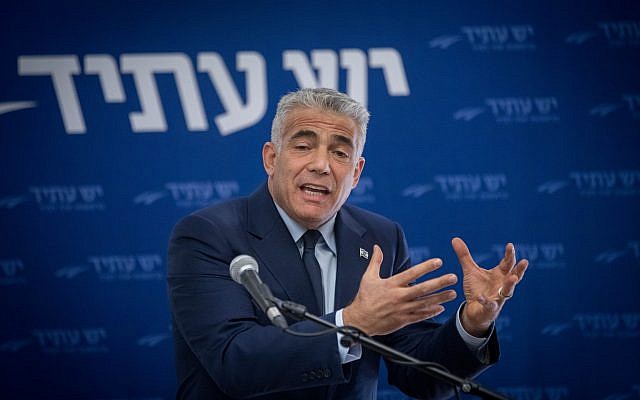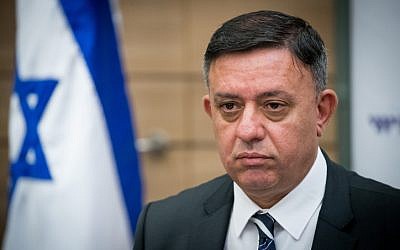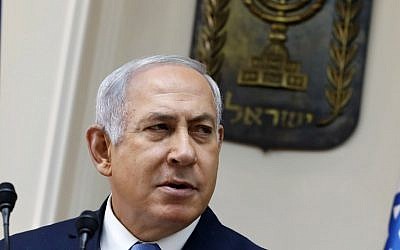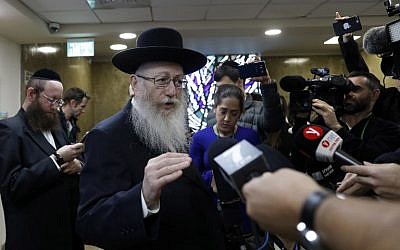Yesh Atid’s Yair Lapid says proposal designed to protect PM from prosecution; Labor’s Avi Gabbay lambastes coalition as ‘gang members’

Opposition leaders on Monday slammed the advancement of a bill restricting police authority to recommend criminal charges as an attempt to protect Prime Minister Benjamin Netanyahu from the corruption probes into his affairs.
Coalition leaders, meanwhile, were touting the stability of the coalition following a short-lived crisis on Sunday that saw United Torah Judaism’s Yaakov Litzman resign as health minister over state-sanctioned train maintenance on Shabbat.
“After Netanyahu said the law would not relate to him personally, they fought like crazy so that the law would apply to him,” Yesh Atid leader Yair Lapid said at the start of a Yesh Atid faction meeting.
He was referring to a revised bill, approved by a Knesset panel a short while earlier, banning police — upon wrapping up an investigation into public officials — from informing prosecutors whether there are grounds for indictment, as well as publicizing information or leaking their conclusions to the media.
A last-minute change inserted in the legislation would permit the attorney general to seek police input in the existing corruption probes into Netanyahu, though, critically, he and police would be banned from publicizing those recommendations.
“They made sure that this law would apply to the Netanyahu investigations,” Lapid said. “It’s a law made for a single person.”

The bill was to be brought to a first reading in the plenum later on Monday.
Also blasting the police bill, Zionist Union chairman Avi Gabbay said Netanyahu’s government has “crossed the point of no return.”
At the start of a Zionist Union faction meeting, Gabbay directed his remarks to members of the coalition who voted in favor of the controversial bill: “Look what’s become of you?”
“Like low-level gang members who are sent to disrupt investigations and clean up crime scenes, that’s who you’ve become,” he said.
The bill has widely been seen as an attempt by Likud lawmakers to shield Netanyahu from the public fallout should police find sufficient evidence to warrant criminal charges by prosecutors.
Netanyahu is being investigated on allegations of accepting pricey gifts from billionaire benefactors and an alleged quid-pro-quo deal with a newspaper publisher, in two separate cases. The prime minister denies all the charges against him.
In the committee meeting, the coalition Kulanu party voted in favor of the bill after two revisions were inserted into the legislation, one of which was the one that would allow police recommendations to be made in the Netanyahu investigations, though not to be published.

The second revision sets a one-year prison sentence for investigators who leak their conclusions to outside sources, which appears to extend to all cases. However, in the current and softened draft, whether to pursue charges against investigators is left up to the attorney general’s discretion. The proposal calls on the attorney general to publicize directives on the matter within 90 days.
In a press conference, Kulanu leader Moshe Kahlon defended his party’s decision, noting the attorney general would have the final say in the Netanyahu cases.
The criticism is “unfounded and absurd,” the coalition party leader said. “From the first moment, I said we’d support the recommendations bill and at the same time I said it won’t apply to Netanyahu’s investigations.”
“Regarding ongoing investigations, including the investigation into the prime minister, the attorney general will decide. He is clean, honest, and professional. We are relying on him,” added Kahlon.
‘The government is stable’
In the coalition’s Likud, Yisrael Beytenu, and Jewish Home parties’ separate faction meetings on Monday, party leaders underlined that the government was “stable” and elections were not imminent, following a short-lived crisis over rail work being done on Shabbat.
“This government is strong, this government is stable, and we will continue to work together for the State of Israel and its citizens,” Netanyahu said during the Likud faction meeting.
He thanked his coalition partners for acting “responsibly” in defusing the fight over the Jewish day of rest.
“I must shut down the joy of the opposition: This government is stable and strong and and will continue to be,” chimed in Jewish Home party leader Naftali Bennett on Monday.
Following Litzman’s resignation, Netanyahu on Sunday reached a deal with his ultra-Orthodox coalition partners amid growing tensions over public work on the Jewish day of rest. According to the outline of the agreement, the government will propose a law maintaining the status quo with regard to Shabbat observance in Israel.
Hadashot news (formerly Channel 2) reported that the legislation will allow the mini-markets in Tel Aviv to remain open on Shabbat and will ensure no disruption to weekday train service (meaning maintenance work can be carried out on Shabbat).
Speaking at the Yisrael Beytenu meeting, Defense Minister Avigdor Liberman hailed the compromise.

“The most important thing from my perspective is that the crisis around the resignation of Health Minister Yaakov Litzman is over and we also managed to preserve the status quo,” said Liberman. “I think it’s obvious to all that now is not the time for elections.”
The Yisrael Beytenu leader vowed he would fight any attempts by Interior Minister Aryeh Deri to advance legislation to shutter the mini-markets on Shabbat, saying it should remain at the discretion of local councils.
Though the deal appeared to uphold the status quo, Deri from the Shas party on Sunday had sought to portray the agreement as a victory for the ultra-Orthodox parties.
“We succeeded in reaching an agreement regarding the mini-markets and other subjects,” Deri said. “This is a Jewish state and most citizens want to feel Shabbat in the streets and in their cities.”
As reported by The Times of Israel
